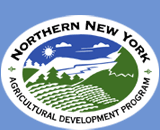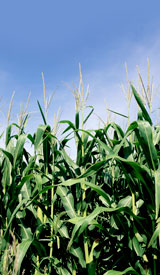October 16, 2009
Contacts: See list at end
Northern NY Apple Growers Modernizing Orchards
Northern New York – More crop harvested per acre means higher return to
farmers.
High density apple orchards trained to the Tall Spindle system can
produce six times more apples than older style orchards during the first
five years and produce almost double the yield when the orchard is
mature.
The Northern New York Agricultural Development Program and New York Farm
Viability Institute are funding research to evaluate the opportunity for
regional apple growers to modernize their orchards with this
high-density orchard system.
Project leader Terence L. Robinson, a Horticultural Sciences professor
with the Cornell University Agricultural Experiment Station at Geneva,
NY, says, “Modern high density orchard planting systems will help
growers modernize their orchards to improve production efficiency, yield
and fruit quality as well as grow new varieties to be remain competitive
in the world apple market.”
Robinson is working with three Clinton County apple growers: Everett
Orchards and Forrence Orchards in Peru, NY, and Chazy Orchards in Chazy,
NY. The research is being conducted in collaboration with Cornell
University and the Cornell Cooperative Extension Northeastern NY
Commercial Fruit Program.
The research is evaluating pre-plant site and variety selection, land
preparation, rootstock spacing, training systems, fertilization,
irrigation, pruning, and thinning using five different orchard systems:
Central Leader, Slender Pyramid, Vertical Axis, Solaxe, and Tall
Spindle.
Densities in the systems range from 218 trees per acre to 1,307 trees
per acre.
The research results will provide growers with data on opportunities to
reduce labor costs through mechanization and increase yield and profit.
The project is also developing cost data for capital and equipment
requirements for the five different orchard systems.
Robinson says, “The manner in which a grower pieces together the many
decisions that form his orchard system often defines his economic
success. Successful replanting of old orchards with popular new
varieties in high density orchard systems will help the long-term
viability of the Northern New York fruit industry.”
This Northern New York research project also involves:
• researchers and growers evaluating new rootstocks for winter
hardiness.
The severe winter cold in 2002 killed more than 20,000 trees of the M.7
rootstock in Champlain valley orchards. The new rootstocks at the
participating orchards include 17 bred by the Cornell Geneva apple
rootstock breeding program; some from Germany, England, Russia, Canada,
and Poland; and 16 of the leading dwarfing rootstocks for NNY.
• an annual thinning and return bloom management trial for the biennial
but premium apple variety - Honeycrisp. and
• annual pre-harvest drop control trials for the main variety grown in
Northern New York – the McIntosh apple.
Robinson says, “The Honeycrisp is an extremely high quality apple and
one of the best tasting apples around, but it is proving to be difficult
to manage for annual production. Improved thinning strategies are
essential to result in annual bloom and the long-term successful
production of this variety.”
He adds, “With the McIntosh, we hope to optimize the use of stop-drop
spray treatments to reduce the pre-harvest dropping of apples, and to
spread out the harvest using fewer pickers while still maintaining fruit
quality. In some years, twenty to fifty percent of the apples can fall
before harvest - that requires a very large labor force to pick the
apples before they fall. Our improved drop control treatments will mean
more apples will be harvested and sold with fewer pickers required. That
reduces costs for the Northern New York apple growers.”
The Northern New York Agricultural Development Program is a
farmer-driven research, outreach and technical assistance program
working with farmers in New York’s Clinton, Essex, Franklin, Jefferson,
Lewis and St. Lawrence counties. Learn more at www.nnyagdev.org. The New
York Farm Viability Institute is a farmer-led nonprofit group that
awards grants for applied research and outreach education to help farms
increase profits and provide models for farmers statewide. Learn more at
www.nyfvi.org.
Contacts:
Project leader: Terence L. Robinson, Cornell University, 315-787-2227,
tlr1@cornell.edu
Cornell Cooperative Extension Horticultural Educators for
Northern NY:
• Clinton County: Amy Ivy, Anne Lenox Barlow, 518-561-7450
• Essex County: Anita Deming, Emily Selleck, 518-962-4810
• Franklin County: Carl Tillinghast, Richard Gast, 518-483-7403
• Jefferson County: Sue Gwise, 315-788-8450
• Lewis County: Joe Lawrence, 315-376-5270
• St. Lawrence County: Steve VanderMark, 315-379-9192
Cornell Cooperative Extension Northeastern NY Commercial Fruit
Program:
Kevin Iungerman, 518-885-8995,
kai3@cornell.edu
Northern New York Agricultural Development Program: www.nnyagdev.org
• Co-Chair Jon Greenwood: 315-386-3231
• Co-Chair Joe Giroux: 518-563-7523
New York Farm Viability Institute:
www.nyfvi.org



